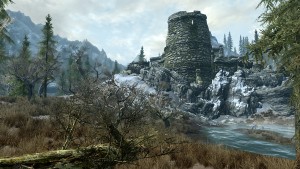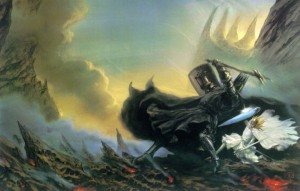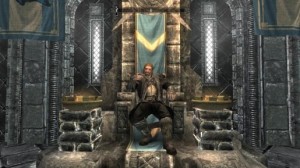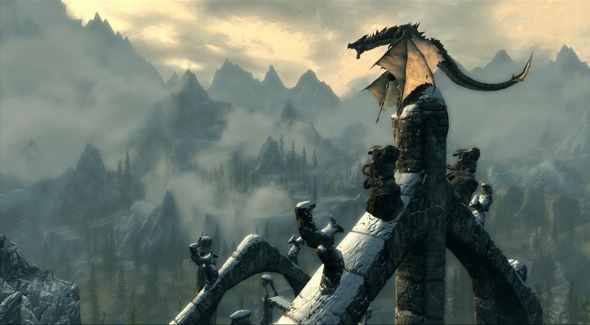The Elder Scrolls series is rife with this sort of historical revisionism. But let’s focus more on the most recent entry: the exceedingly popular Skyrim.
Skyrim sets the clock farther ahead than any of the previous four games. Four hundred years after the events of Oblivion, the Empire is no longer what it once was. The Imperial Legion and a band of rebels, the Stormcloaks, have thrown the province of Skyrim into civil war. Players who’ve been part of the Elder Scrolls series for a while might be intrigued to discover that they’re now a part of history.

It's a fixer-upper.
The civil war itself can be viewed as a debate between rival factions over the historical record. The Stormcloaks consider themselves faithful to Talos – the oath that you swear to the Stormcloaks calls on Talos by name. But “Talos” is the divine name for the first Emperor, Tiber Septim, in whose name the Imperial Legion fights. The war between the two is a feud over the legacy of Talos – what would the god-hero of mankind wish if he were alive today?
Other examples abound. In the first four games, Stendarr was the Imperial god of righteous strength and mercy. In Skyrim, however, the Vigilant of Stendarr wander the countryside and hunt down Daedric cults. The Mythic Dawn were a secretive cult that slew the Emperor in Oblivion; in Skyrim, they’re a quaint historical memory, preserved in a museum in Dawnstar.
Even the stories of the creation of the world differ, with humans and elves having different takes, according to in-game text. This is something of a rarity in the fantasy genre. Even if the characters in The Belgariad don’t know how the world was created, the author does. Ever since Tolkien and The Silmarillion, consumers of the fantasy genre have come to expect a certain knowability in their fiction. There’s no alternate narrative that says no, Melkor was really trying to liberate the Elves from Valar tyranny by destroying the Two Trees of Valinor.

History will validate me!
This isn’t to say that plot twists revealing deeper truths are foreign to fantasy video games. Star Wars: Knights of the Old Republic is a prominent example, with a mid-game plot twist that throws all of the backstory into a different light. But that’s a very personal plot twist that tells you (the player) something different about yourself (the character). Elder Scrolls plot twists, such as they are, tend to tell you something different about the world a thousand years ago.
The Elder Scrolls series is also distinct in how much of its backstory is revealed through supplementary texts. You can make it through the entire game without reading any of the historical texts you find tucked on various bookshelves. Elder Scrolls is far from the only RPG to build out its universe this way, but I personally find the in-game text in Skyrim far more compelling than that of Dragon Age.
(In fact, the only series I’ve played that matches it for literary quality is Deus Ex, the latest incarnation of which I have on my shelf at home. I haven’t opened it yet, as I’m still busy with Skyrim)
I’ve written before about the next evolution in storytelling through videogames and I think the Elder Scrolls series is a forerunner in that direction. After games where none of your choices matter (platform games) and games where only your choices matter (sandbox games), we now have games where only your beliefs matter (interpretive games). You can play through the infamous “No Russian” level of Call of Duty: Modern Warfare 2 by either shooting civilians or not. The level ends the same either way: your character gets shot in the head. The only variable is you: whether the slaughter of civilians shocks you, thrills you or leaves you a desensitized lump.
Similarly, your choice to play Stormcloak or Imperial – or to even take sides in that fight at all – says more about your interest as a player than your choices as a character. Both sides have similar missions: rescuing fellow faction members, capturing forts, laying and breaking sieges. Both sides have opportunities for warriors, rogues or magic-users to cause havoc. While completing either quest produces different outcomes, the game world will still be largely similar. All that changes is you, the player.

Watch the throne.
There is no definitive text that says which side is right: whether the Stormcloaks truly have the right to rule Skyrim, or whether the Imperials are the only hope for peace and prosperity. You have to make that call on your own as a player. In doing so, you’re engaging in historical revisionism of your own. In the hundreds of years prior to the start of Skyrim, were the armies of the Septim Empire a force for good or oppression? Are the Nordic traditions a source of pride or a dishonorable throwback? Your answer to that question – and you can find texts in game to convince you of either – determines the side you choose.
The opportunity to reinterpret history, though not rewrite it, puts Skyrim (and the rest of the Elder Scrolls series) in a rare place among games. It calls into question the role of you, the person holding the controller. Are you a player in a game or the author of a narrative? Skyrim has enough sandbox elements that it challenges the historical definitions of a “game.” There is no stopping point: there’s a main quest that you can complete, but the action keeps trucking after you finish. The “game,” if we can still call it that, continues until you set down the controller, just like a manuscript remains stable until you pick the pen back up. And when your actions shape the course of empires – empires that are documented either in the words of people you talk to or in books you find lying around – there’s a strong drive to leave that manuscript on a solid ending.
(Anyone else play through Morrowind, then pick up Oblivion, hear a rumor that the Nerevarine had headed to Akavir, and say to themselves, “I did? Er, I mean, he did?”)
Of course, in a game that’s rife with such historical revisionism, your enthusiasm to direct the path of history might be dampened. Who’s to say how future generations will remember you? After all, everyone you meet in Skyrim mentions how the Third Era ended with the death of Martin Septim, the last of the Dragonblood Emperors. No one mentions how your Redguard clad in enchanted daedric armor took on an army of dremora and even got in a few good licks on Mehrunes &$#@ing Dagon. Perhaps the Elder Scrolls are meant to encourage cynicism, not optimism.
Either way, by presenting a world with such rich history and giving players extensive option to make their own path in it, Skyrim forces us to reconsider our roles as game players and storytellers.

“Either way, by presenting a world with such rich history and giving players extensive option to make their own path in it, Skyrim forces us to reconsider our roles as game players and storytellers.” I think this is why the RPG genre will never go away.
Also, “There is no stopping point: there’s a main quest that you can complete, but the action keeps trucking after you finish. The “game,” if we can still call it that, continues until you set down the controller, just like a manuscript remains stable until you pick the pen back up.” You can work through the many different sub-arcs e.g. assassin and thieves then turn around and do something completely different. Much like some of the long winded prose placed in books scattered through the game, the player can mold Skyrim vis a vis the way Skyrim interacts with them. The game space is a great world to get lost in making.
What I found really interesting was the only people Skyrim portrays as unambiguously evil (besides dragons) are the Thalmor, the elf supremacists who invaded the Empire and made it a client state. One reason we know they are bad guys because the Thalmor claim to have ended the Oblivion Crisis in the elf lands. (Oblivion spoilers:) We know this is wrong because in Oblivion, you and the emperor are personally responsible for ending the crisis across the entire continent. Because the Thalmor are secondary to the main plot, you can’t do anything about this (not that correcting them on a centuries-old historical point would matter much to what is happening in Skyrim).
I haven’t spoken to enough Thalmor in my playthrough yet to get to that point, but that’s interesting! Another good example of historical revisionism. The victors write the history books.
I’d recommend finding and reading Rising Threat, Vol. 1-4; they’re the accounts of an Altmer during the time of the Oblivion Crisis and afterwards during the rise of Thalmor.
Also, slight edit:
“Skyrim sets the clock farther ahead than any of the previous four games. Four hundred years after the events of Oblivion, the Empire is no longer what it once was.”
Skyrim only takes place two hundred years after Oblivion. The Third era ends at 3E 433 (which becomes 4E 0), Skyrim’s events begin in 4E 201.
Yeah, it was 200 in the original draft, but I changed it post-publishing. Don’t know why I was suddenly convinced it was 400.
The thing is, even games that offer choices almost inevitably push you in one direction or another. Assume I’ve decided to play Skyrim as a (for want of a better term) Lawful Good character. When I encounter the Thieves guild or the Dark Brotherhood, I would obviously be disinclined to join. But in that case, I’m going to miss out on two of the half a dozen questlines that make up a major part of the game’s content. At least, in Skyrim, they put in an option that, after you first meet the Dark Brotherhood, you can choose to report it to the authorities, and they’ll send you to kill them all. But a single battle, even with the decent loot you’ll get, is never going to match what you could have gotten out of the questline. And the Thieves Guild doesn’t even allow you that – your choice is between doing the whole questline and not doing any of it. Moreover, once you start a questline, you can’t back out of it or change your mind. The option to tell the authorities about the Dark Brotherhood is no longer open after you decide to join, whether or not you’ve killed anyone for them yet. Thus, the gameplay itself tends to promote one path or another, and if your beliefs, informed by the game world, differ, you can either choose a lesser experience or force yourself to quash your beliefs.
The alternative is also problematic. This is what was done with Stormcloaks vs Imperials, to have the choice essentially mean nothing in terms of gameplay… but gameplay translates into content. I was somewhat surprised to discover that a band of rebels and a professional Imperial army had the exact same tactics and strategy to defeat the other. In order to stop people making decisions based on ‘what will gain them the most xp/loot/interesting missions’, the game makers are forced into making every choice exactly the same… except for the interpretive content. Now this works ok if used occasionally; but imagine if the Dark Brotherhood, the Thieves Guild, the Magic College, the Companions the Bard’s Guild and even the main quest all had alternative questlines that were equal and opposite to them in every particular except for their moral and historical background. It’s going to seem extremely contrived, extremely quickly. Especially since, if you’re making choices, you want them to have consequences you can see and understand – and consequences more subtle and variable than the good ending/evil ending dichotomy you get in games like KotOR.
This is possibly less relevant to the question of historical revisionism, except as you want it to affect the gaming itself. But if it can’t affect the gaming, then you’re basically just being railroaded down a plot, just like before.
But if it can’t affect the gaming, then you’re basically just being railroaded down a plot …
The difference is if the plot is ambiguous enough to force you to consider the story different. Think of Braid, for instance, or Portal. I think that’s an interesting next step in video game design.
That’s true, but I can see a distinction between those games, where the ambiguity is that you cannot be sure what is actually happening at the moment (or why), and Skyrim, where, in the Imperial vs Stormcloak struggle, you’re entirely certain of what’s going. The ambiguity in Skyrim is about history and also your political values. Self-determination vs the order and stability of an imperial government, for instance. Instead of making you ask what is going on and why, you’re asking, should it be going on and is my support of it a good thing.
They are, of course, very different types of games, and the things that suit an RPG would probably be out of place in a puzzle type game (and vice versa). But I do think that RPGs are stuck between having your choices likely being more influenced by gameplay than beliefs, or having contrived plot scenarios where every belief and choice turns out exactly the same.
I completely agree with this train of thought, although I’m also extremely cynical of Skyrim’s choices and storytelling, given how they completely cocked up even the most basic roleplaying elements (For a simple example, in a province so full of racial tension, there isn’t a single point in the game where your choice of race changes anything. It’s one thing to allow the roleplaying to take place in the player’s imagination, but when the player does something that should be acknowledged and isn’t…that’s just poor storytelling/roleplaying).
Argh, tangents!
Anyway, while there are many RPGs that suffer from the problem of gameplay outweighing actual beliefs (ie. KOTOR, where actual roleplaying is punished – you’ll lose force mastery if you don’t pick the blue or red option every time), and many more where your choices have the same outcome (Mass Effect fits this bill – the series has has no meaningful consquences for any of your actions)…I think there might be a couple RPGs that have both meaningful/drastic story consequences *and* allow the player to follow their own beliefs.
The prime example that comes to mind is The Witcher 2…which isn’t much of a surprise, since that series is absolutely determined to revolutionise the way players think about decisions. The game features a malleable protagonist – one with a set role in the game (that of Geralt of Rivia, professional monster hunter), but whose motives are entirely flexible. Through dialogue and actions, the player fleshes out what it is that Geralt desires (be it revenge, the secrets of his past, his long-lost love, etc), and what he shall pursue during the course of the story. These choices are not hugely influenced by the gameplay (they will often only have far reaching consequences, unknown to the player at the time), nor are they purely interpretive (other characters will question your motives based on earlier decisions, even those the player made in the previous game), nor do they railroad you towards the same outcome (the entire second chapter is vastly different depending on your decisions in the first chapter – different towns, different plot threads, different quests and battles, etc).
So it seems as if The Witcher 2 is…ugh, I don’t want to use a cliche like ‘the finest example of choice-based storytelling at present’, since it isn’t perfect. What it does offer is a wondeful blend of all of the above modes, and it does them really, really well. It’s one of the few games I’ve ever played where players have vehemently argued over the story decisions they have made, both sides firmly believing that their decision was not only absolutely right, but the obvious choice to make in that situation (“he’s a terrorist!” “he’s a freedom fighter!”)…and that’s a wonderful thing indeed for these sorts of games.
The Deus Ex series has been good at providing different narrative outcomes if you align with different factions. (I still need to play the newest one; it’s on my shelf)
On a side note;
While I sadly haven’t had time to read it I can think of at least one novel that casts Sauron in a similarly positive light (a link to the full English translation is available at the bottom of the Wikipedia page).
(I was going to write something about the implicit, arguably reactionary ideological underpinnings of the traditional Fantasy world from Tolkien and onwards, and various parodies of and, other reactions within the genre against this, but I realise others have probably written about this before and better, so I’ll just leave the link as a hopefully amusing example).
Although there seems to be one important difference between The Last Ringbearer and the Elder Scrolls series (or what I can gather from this article, not having played any of the games) that I suppose I ought to emphasise.
While The Last Ringbearer appears to be modern and epistemically unproblematic, merely replacing one True Account of life in Middle Earth with another (significantly, Tolkien’s nostalgic, negative account of modernity and modern technology with one more positive), the Elder Scrolls series seems more postmodern and epistemically problematic in how it merely offers different, irreconcilable accounts of historical events, without providing any authoritative answer as to which is the correct one.
(I seem to have problem posting again, so I’m reposting this. As usual, if this is a double post, please delete it)
Although there seems to be one important difference between The Last Ringbearer and the Elder Scrolls series (or what I can gather from this article, not having played any of the games) that I suppose I ought to emphasise.
While The Last Ringbearer appears to be modern and epistemically unproblematic, merely replacing one True Account of life in Middle Earth with another (significantly, Tolkien’s nostalgic, negative account of modernity and modern technology with one more positive), the Elder Scrolls series seems more postmodern and epistemically problematic in how it merely offers different, irreconcilable accounts of historical events, without providing any authoritative answer as to which is the correct one.
(apparently I have problems posting again, as usual, if this is a double post, please delete it)
Although there seems to be one important difference between The Last Ringbearer and the Elder Scrolls series (or what I can gather from this article, not having played any of the games) that I suppose I ought to emphasise.
While The Last Ringbearer appears to be modern and epistemically unproblematic, merely replacing one True Account of life in Middle Earth with another (significantly, Tolkien’s nostalgic, negative account of modernity and modern technology with one more positive), the Elder Scrolls series seems more postmodern and epistemically problematic in how it merely offers different, irreconcilable accounts of historical events, without providing any authoritative answer as to which is the correct one.
Damn, I triple posted. Now this is downright silly!
I’ll add my endorsement to The Last Ringbearer. It’s a very fun read, and some of the tangents he explores are incredible (the Empire of Harad, the espionage in Umbar, etc.).
I’ll only do it once, though, not twice or three times [a lady…]